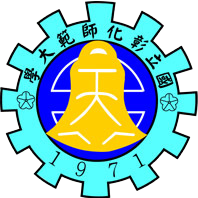SDG16.3.2 Policymaker and lawmaker outreach and education
NCUE faculty members actively assist policymakers and lawmakers by providing outreach activities and courses relating to sustainable development (SDG) concepts such as economics, law, technology, migration, displacement, and climate change. The NCUE faculty members in relevant professional fields serve as advisory members to government agency’ committees and help implement the agencies’ plans. They ensure that the policymakers and lawmakers recognise and understand the sustainable development concepts and guide them in finding feasible strategies and specific actions towards achieving the United Nations’ 2030 SDGs. Some examples follow:
1. In 2021, four NCUE faculty members implemented eight projects entrusted by government agencies, helping policymakers and lawmakers to improve their awareness of relevant sustainable development goals:
1.1 Two faculty members assisted in two “economic” projects:
1.1.1 Yu-Chung Wei, Professor at the Graduate Institute of Statistics and Information Science, implemented the “Statistical Analysis of the Composition of Oil and Gas in Taiwan” project of CPC Corporation. Using statistics and machine learning analysis, the project explored the potential oil and gas reserves in the oil and gas mining areas in Taiwan in order to improve Taiwan’s energy economy.
1.1.2 Chiu-Luan Hsieh, Professor at the Department of Biology implemented the “Using Ai Intelligent Neural Network and Bionic Transformation Mechanism to Establish an Industrial Production Process of High Economic Crocetin” project of the Ministry of Science and Technology, introducing environmentally friendly microbial engineering methods to conduct bionic transformation on crocetin that had been mass-produced in cell factories in order to mass-produce CCN raw materials.
Link:https://www.grb.gov.tw/search/planDetail?id=13866514
1.2 A faculty member assisted in a “technological” project:
Chin-Ping Hu, Professor at the Department of Geography, implemented the “Beyond the Coalescence: Exploring the Multi-Messenger Astrophysics with Advanced Time-Frequency Analysis Techniques” project of the Ministry of Science and Technology to identify the multi-messenger characteristics of celestial bodies in electromagnetic and gravitational waves. This research achieved its goal on four levels: (1) Establishing advanced mathematical algorithms, (2) Observing continuous gravitational wave sources with NinjaSat; (3) Performing pilot studies of disk instability in X-ray band, and (4) modeling the gravitational waveforms of accretion disks and supernovae.
1.3 A faculty member assisted in five “climate change” projects:
1.3.1 Chung-Chi Lin, Professor at the Department of Biology, implemented the “2022 Shoushan National Natural Park Plan of Survey, Monitoring and Control against Yellow Crazy Ants” project of the National Natural Park Management Office. This year, the project focuses on dense areas with a high density of yellow crazy ant colonies in the windbreaks surrounding the seawall of Mountain Qi Hou, and plans to control the number of ants with liquid baits and insect growth regulator baits. Insect traps and baits are used for investigation and monitoring to evaluate the control effect. The distribution of yellow crazy ants is also investigated in the habitats of terrestrial crabs in Mount Banping and the Northern Shoushan military control zone.
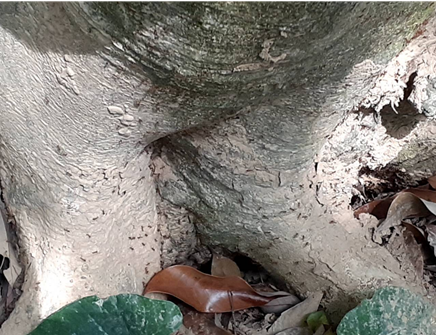
Figure : Areas with a high density of yellow crazy ant colonies in Shoushan National Natural Park
1.3.2 Chung-Chi Lin, Professor at the Department of Biology, implemented the “2022 Kaohsiung City Evaluation Plan for the Survey and Control Strategy of Flying Ant Harm” project of the Kaohsiung City Government to reduce the disturbance caused by dolichoderine ants and prevent their population from continuing to expand and spread. The project also monitors and investigates areas experiencing serious harm from Technomyrmex ants and identifies the reasons for the harm. Control test areas are also set up to develop control strategies, control the density of dolichoderine ant colonies, and reduce the disturbance flying ants cause to the public.
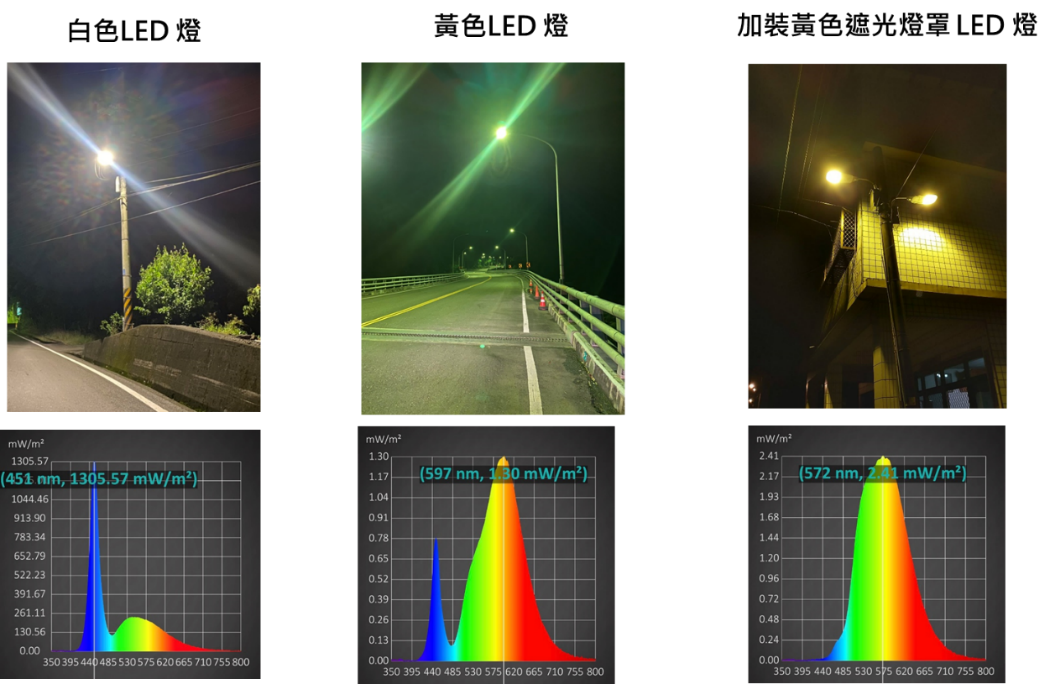
Figure : Yellow lampshades are added to LED street lights to prevent harm from flying ants
1.3.3 Chung-Chi Lin, Professor at the Department of Biology, implemented the Ministry of Science and Technology’s project “Discussion on and Solutions to the Problem of Pest Ant Damage Caused by the Impact of Climate Change on the Lowland Ecology and the Change of the Lowland Community,” which helped establish a model for the spread of dolichoderine ant colonies and invent microbial control repellents against dolichoderine ants.
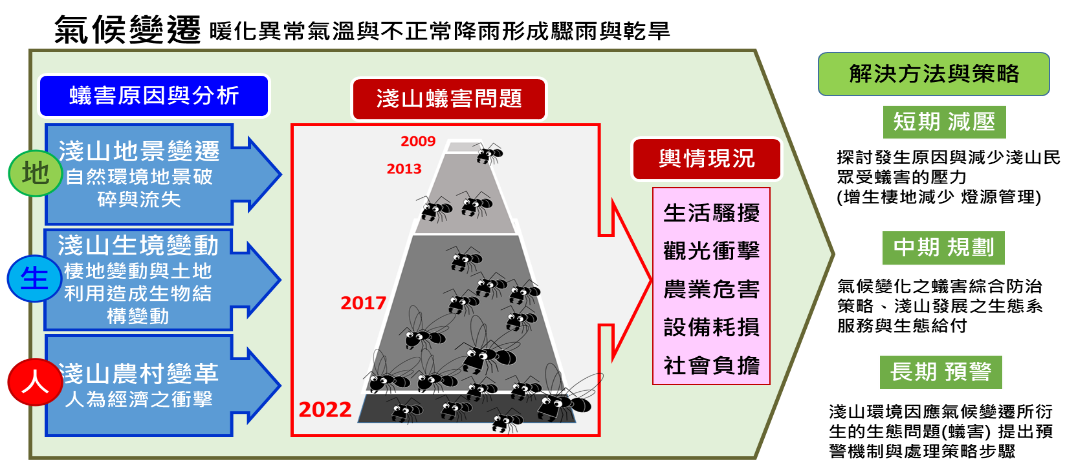
Figure : Discussion on and Solutions to the Problem of Pest Ant Damage Caused by the Impact of Climate Change on the Lowland Ecology and the Change of the Lowland Community
1.3.4 Chung-Chi Lin, Professor at the Department of Biology, implemented the “Field Survey on Ants in Farms Cultivated by Different Farming Methods,” showing that biodiversity can be protected in agricultural production while ants can play a role in ecological services, so as to achieve a socio-ecological-production landscape that allows the harmonious coexistence of agricultural ecosystems and organisms.
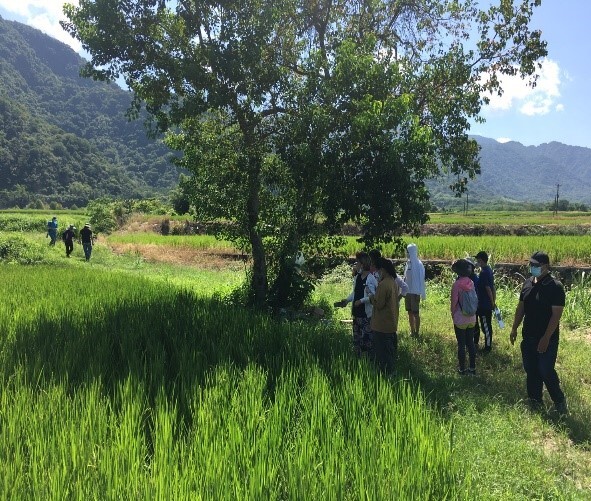
Figure : A paddy rice field in Yuli Township during spring
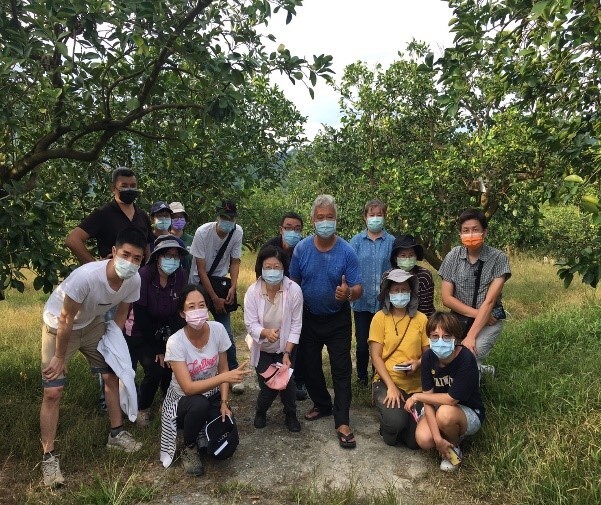
Figure : A pomelo garden in Majuli, Hegang Village, Hualien
1.3.5 Chung-Chi Lin, Professor at the Department of Biology, implemented the “Survey on Pasture Insect Resources in Fuxing Township, Changhua County” of the Council of Agriculture, Executive Yuan, in which 20,652 individual invertebrates belonging to six classes, 20 orders, and 101 families were collected. Among them, 20,215 individuals of Insecta belonging to 13 orders and 90 families were caught. Most of them belonged to Diptera (26.7%), followed by Coleoptera (21.1%), and Hemiptera (15.6%). Studies have shown that pastures in Fuxing Township can be restored over time, so it is believed that the existence of pastures around farmland is essential for increased biodiversity.
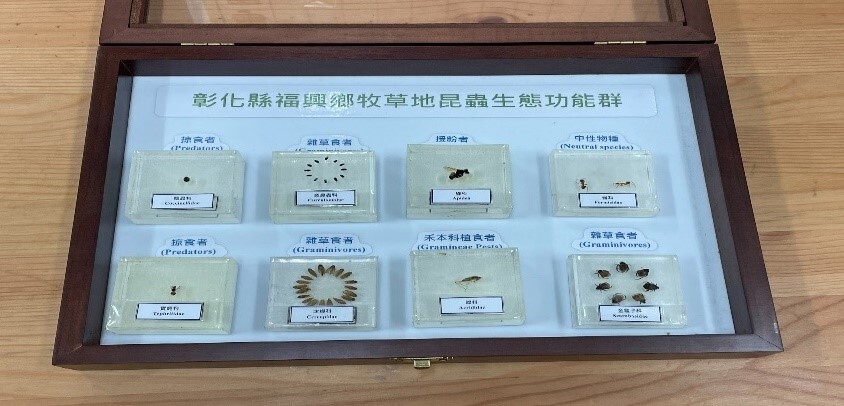
Figure : Insect fauna specimen for pastures in Fuxing Township of Changhua County
2. NCUE’s faculty members serve as the members of government agencies’ committees advising policymakers on feasible strategies and specific actions for specific SDGs:
2.1 Professor Wei-Tzer Huang from the Department of Industrial Education and Technology serves as a member of the Electric Reliability Council of the Ministry of Economic Affairs, participating in meetings concerning Taiwan’s long-term power load forecasting, renewable energy development, and power system operation reliability.
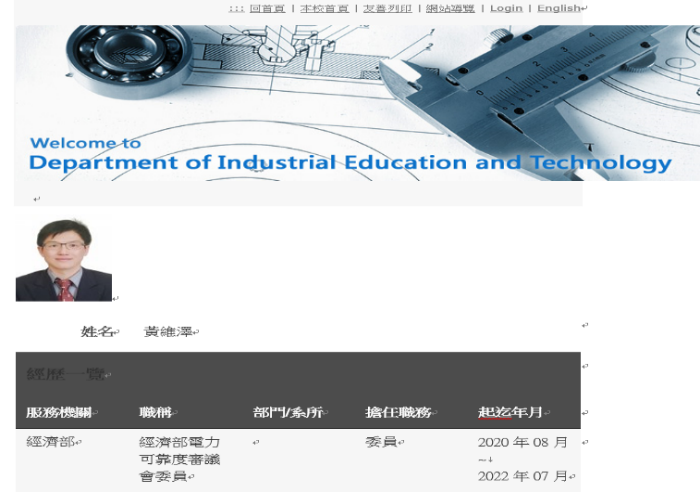
Above figure:Professor Wei-Tzer Huang serves as a member of the Electric Reliability Council of the Ministry of Economic Affairs
2.2 Professor Chung-Chi Lin from the Department of Biology serves as the executive director of the National Red Imported Fire Ant Control Centre of the Council of Agriculture and is responsible for planning and implementing professional technical support and emergency control plans. Among the exotic species in Taiwan, Solenopsis invicta, red imported fire ants or RIFA, are extremely dangerous pests. First found in Taiwan in October 2003, RIFAs have since invaded large areas in Taoyuan County, Taipei County (now New Taipei City), and Chiayi County, with sporadic outbreaks in neighbouring counties and cities. The RIFAs have caused varying degrees of harm to the agricultural environment, ecological environment, and human health. The National Red Imported Fire Ant Control Centre was established in November 2004 to provide overall notifications and control actions on RIFA infestations. The Centre also researches effective monitoring methods and control strategies suitable for Taiwan’s ecological environment, cooperates with communal and non-governmental organizations to educate the public about the problems, and helps train seeded teachers to help the government mitigate the spread of RIFAs. NCUE’s Professor Chung-Chi Lin has been an expert consultant to the Centre since its establishment. Since 2015, he has served as the volunteer executive director of the Centre and is responsible for planning, implementing, and supervising professional technical support and emergency control projects.
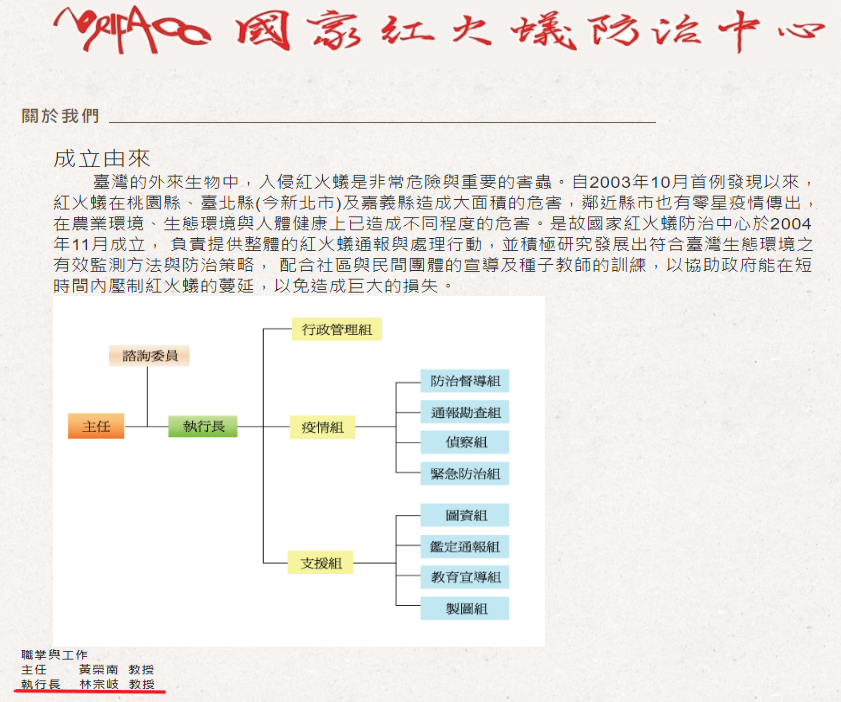
Above figure: Professor Chung-Chi Lin serves as the executive director of the National Red Imported Fire Ant Control Centre of the Council of Agriculture
2.3 Professor Der-Jiunn Deng from the Department of Computer Science and Information Engineering serves as a technology expert to the Department of Industrial Technology, Ministry of Economic Affairs. For the past two years, Professor Der-Jiunn Deng has been a consultant with the Department of Industrial Technology (DoIT), Ministry of Economic Affairs, responsible for R&D and innovation in Taiwan’s ICT. He supervises relevant institutions and companies to solve technical bottlenecks and increase Taiwan’s ICT competitiveness
LINK:. https://trh.gase.most.ntnu.edu.tw/tw/article/content/188
